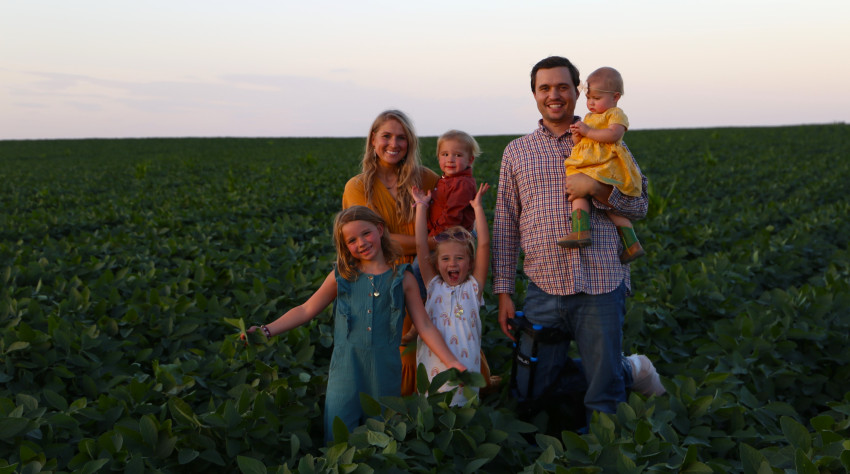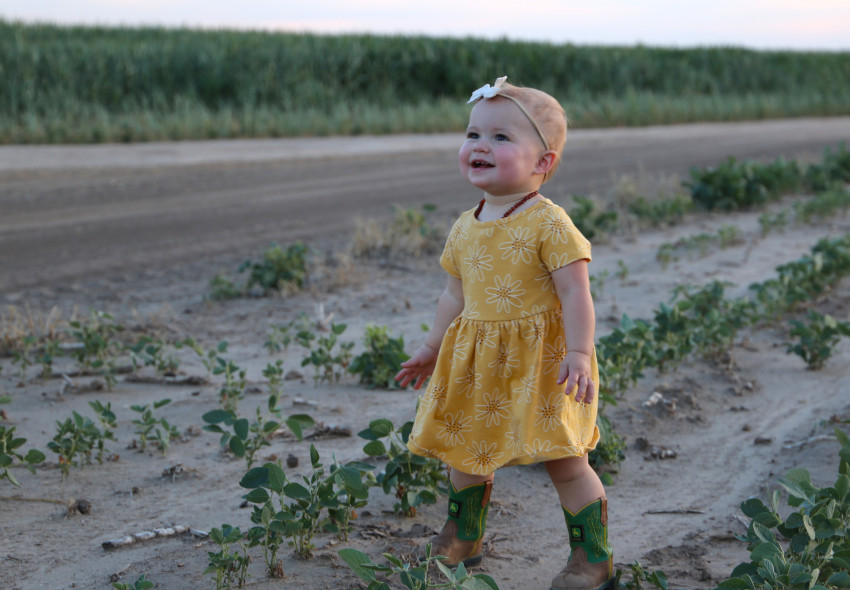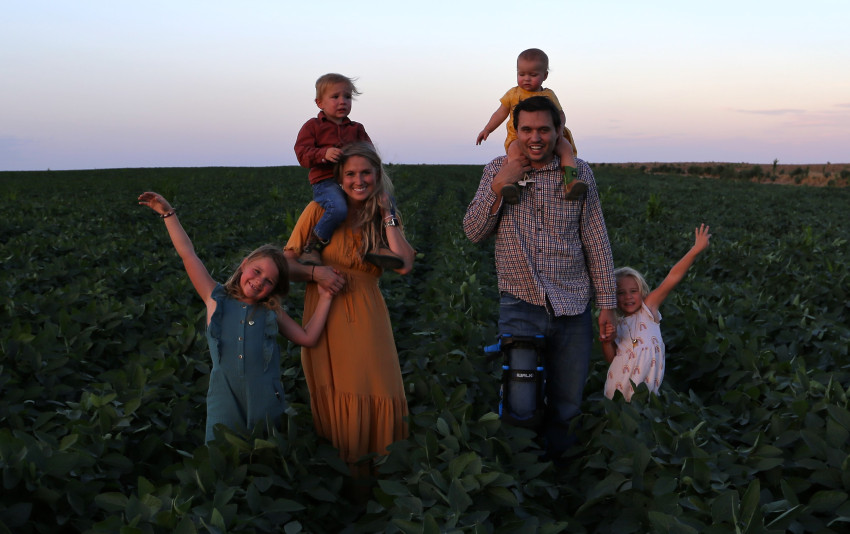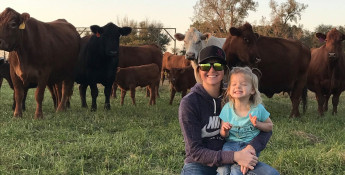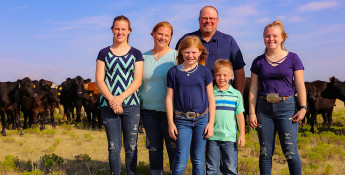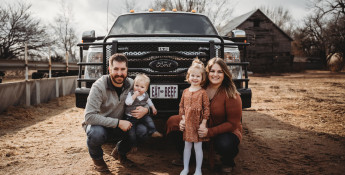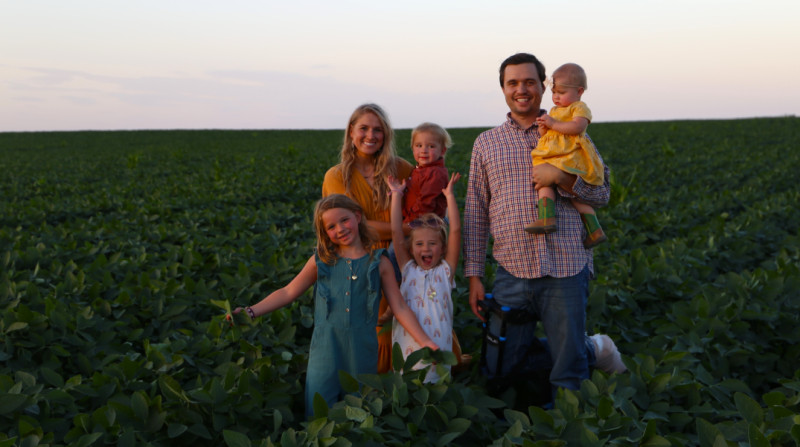By Kansas Living on July 31, 2024
Meet the Love Farm and Ranch Family
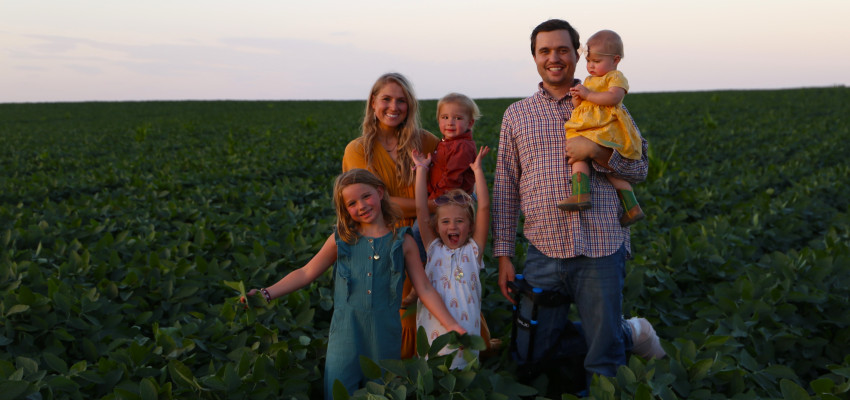
Garrett and Caley Love are farmers and ranchers in Kansas who love what they do and hope to pass their legacy on to their children. Learn more about this family.
GARRETT:
Without a doubt, our favorite and most meaningful crop is our children. We have four kids — Abby, Lauren, Grayson and Eliza — and they keep us busy. They love being farm kids and helping on the farm. We raise corn, soybeans and sorghum on our irrigated farm that is based in Gray County between Garden City and Dodge City. We also feed cattle and host pheasant, deer and coyote hunters from all over the country as part of our Western Kansas Pheasant Hunts business.
What does fall look like on your operation?
Fall is the busiest time of year. A lot of years, corn harvest starts around Sept. 1, then we transition to soybeans and then sorghum. Those can be stressful times for families and operations because so much has been invested into these crops, and there’s a lot of pressure to have a successful harvest. Not a lot of industries have so much work put into a product that is produced and ready at only one time during the year. We’re also starting the school year and trying to coach some of our kids’ sports. Then, about the time harvest wraps up at the end of October or beginning of November, our next “harvest” begins, which is when we start hosting hunters on our farm. It’s a fun change of pace, but it also doesn’t give us much time to just breathe and slow down.
What matters the most to you as a farmer/rancher?
Family - The family aspect of our farm and being a farm family is the most important part. It’s fun everyone can be involved with the farm and help with it.
What is the hardest and best part of your job as a farmer?
The best part of being a farmer is being able to see the finished work and production from a year or more of hard work and investment — especially when things go “right” and Mother Nature cooperates — and being able to enjoy that with our family.
The worst part is when you think everything is going “right” and you’re optimistic about a great year, and how that can all be ruined by a nasty hailstorm or major wind damage that can turn your awesome year into a really bad one very quickly. It’s obviously a huge negative financial impact — because when you’re set up for a great year, insurance doesn’t come close to making up for that opportunity cost lost — but also an emotional one from not being able to harvest the crop we worked so hard to grow.
What does sustainability mean to you?
Sustainability to us means to be efficient with the resources we have been blessed with. It means to not be wasteful and to always try to do more with less. It also means working to ensure that our kids have the opportunity to take part in this farm if that is something they wish to do down the road.
Where do you see the future of your operation going?
I think the marketplace and consumers want more of a connection with their food and how it is produced. I think a combination of consumers and retailers will incentivize that connection on a larger scale.
What’s one thing you’ve changed on your operation since you started?
The most significant change we observed was the increase in wildlife, largely thanks to our shift to no-till farming. This method provided more cover and food, and protected our soil, resulting in thriving populations of pheasants, quail and deer. This realization presented an opportunity for me to return to the farm and contribute to the land my dad began cultivating on a few quarters of ground 40 years ago.
Helping our farm make the transition by identifying more of the differences within fields and how technology can enable us to treat the field differently in terms of seed populations, fertility needs and chemical usages, which can help save money and increase yields, was a significant shift.
What is one thing you wish consumers knew about your operation?
I wish consumers knew that we, and countless other farmers and ranchers, care more about our livestock, care more about our land and care more about what we grow on it than anyone else. We want to do it in a sustainable way to play our part in helping feed the world.
What is your family’s favorite protein? And what is your favorite way to prepare it?
Beef without a doubt! We love steak, tacos and of course hamburgers around here!

